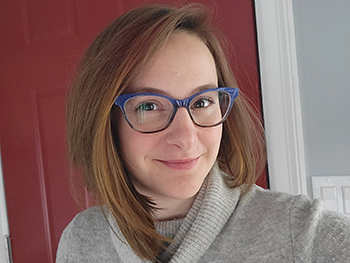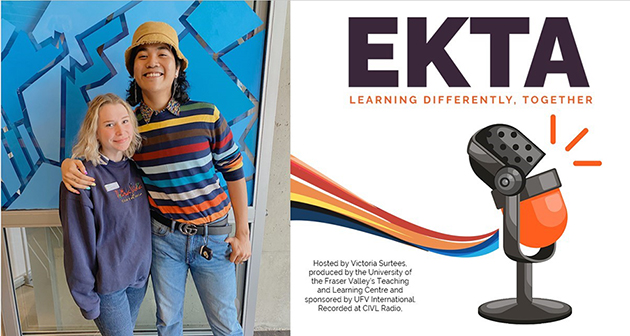New Ekta podcast provides honest and vulnerable conversations with UFV students
Near the top of each on-air interview, Victoria Surtees, the host and creator of the new UFV Ekta podcast series, asks each guest the same two-part question:
“What is one time you have felt powerful and one time you have felt powerless?”
For the UFV students on the other end of those questions, it has prompted raw, thoughtful responses and sparked meaningful discussion.
“It happened when I was having an argument with my family, the moment I felt disconnected with my culture,” answered Bradley Nguyen, an international student from Vietnam, on the inaugural Ekta episode, which went live on August 31.
“It was very traumatizing.”
Giving students from different cultural backgrounds a voice and a platform to articulate their experiences about attending university was part of the motivation for Surtees in starting the podcast (which is produced by the UFV Teaching and Learning Centre and sponsored by UFV International) in late 2021. Another purpose was to help staff and faculty become aware of potential blind spots and gain some tools for supporting students in innovative ways.
“My goal was really to provide a platform to tell complex stories that showed that students had multiple things happening, multiple identities, multiple points of resilience, multiple points of challenge, and all the different things that were coming together to make their student experience,” says Surtees, internationalization specialist at UFV.
 There are currently six episodes recorded that will be released over the fall semester. Each episode comes with a companion PDF full of additional resources to support faculty and staff development around inclusion. In addition to Nguyen, Surtees interviewed a student from Japan, a science student from Kazakhstan, and an Indian student who attended Fraser Valley India in Chandigarh.
There are currently six episodes recorded that will be released over the fall semester. Each episode comes with a companion PDF full of additional resources to support faculty and staff development around inclusion. In addition to Nguyen, Surtees interviewed a student from Japan, a science student from Kazakhstan, and an Indian student who attended Fraser Valley India in Chandigarh.
She also interviewed Indigenous students from the Teacher Education program. Surtees chose the non-English name Ekta as a way of challenging the dominance of English and Western perspectives in Canadian higher education. For her, the opportunity to bring a word from another language into the daily vocabulary of listeners was a small concrete step she could take toward decolonization. She also features at least one non-English word in each of her episodes.
“In most South Asian languages, ekta means unity, solidarity and togetherness,” says Surtees, noting ekta also means “identity” in Icelandic. “For me, all of us at UFV can embody ekta by bearing witness to these powerful stories.”
In her current role, Surtees provides support for staff and faculty looking to create more culturally and linguistically supportive courses and services at UFV. Surtees developed her passion for global relations at a young age, studying the French language in school. When immigrating to France as a young adult, Surtees, who is a white settler, learned about the anxiety associated with obtaining and renewing visas, but also witnessed how people of colour — particularly people from French-speaking Africa — were treated in a racist manner in similar situations.
“It was flagrant,” she says, admitting the memory is still triggering.
The UFV students featured on the first season of Ekta spoke of similar incidents of racism or micro-aggressions. They also shared the financial, cultural, and political challenges of immigrating to Canada and navigating a Western education system.
But the discussions are not just about the challenges or negative experiences. Guests on the podcast speak of new opportunities, faculty and services that supported them, and new friends gained by leaving their home countries. They also provide practical advice on steps our community can take to include and support students in similar situations. Nguyen brought his best friend Billie Brown onto the podcast as well.
“Very often, international students or students in general are more comfortable doing things in pairs,” Surtees says. “Even though they were best friends, Billie admitted she didn’t know the full scope of his struggles before doing the joint interview.”
In working with students, Surtees worked hard to ensure that students were properly recognized and supported when interviewing for the podcast. At each step, she sought guidance from experts and faculty members to ensure students’ safety. She conducted pre-interviews with them, provided an honorarium, and gave them approval and editing power of the final versions. This was a way for the students to share their story on their terms.
“I think a lot of the students have been itching to tell their story and for someone to listen,” says Surtees.
Surtees also had to learn from scratch about the world of podcasting: everything from booking guests to using editing software to marketing the episodes. Supported by the staff at CIVL Radio, she started this process almost a year ago and admits that it was a colossal workload to produce six episodes. But she says it was all worth it, if the podcast can help a staff or faculty member make a change, or make other students with similar stories feel heard.
“I want people to take away this idea that international and Indigenous students are amazing and resilient people,” she says. “The idea of getting to know students on a deeper level. But also acknowledging that they go through unique challenges on campus and in our community.
“We can’t ignore that.”





